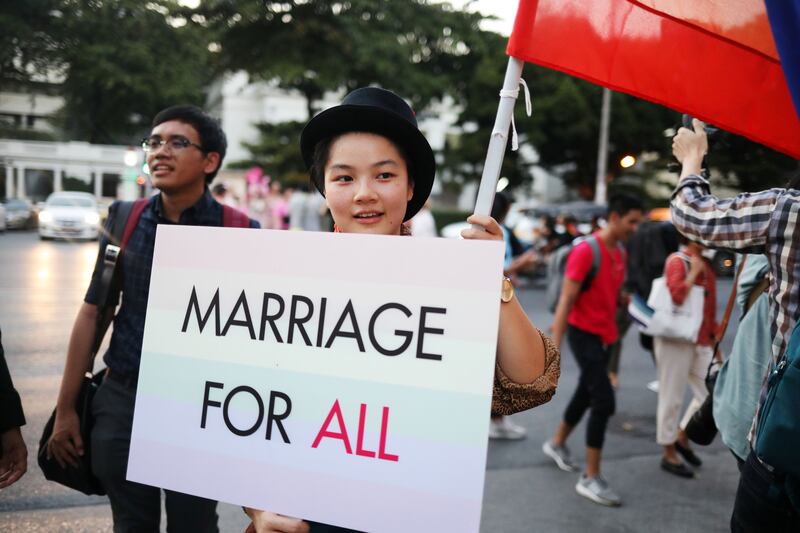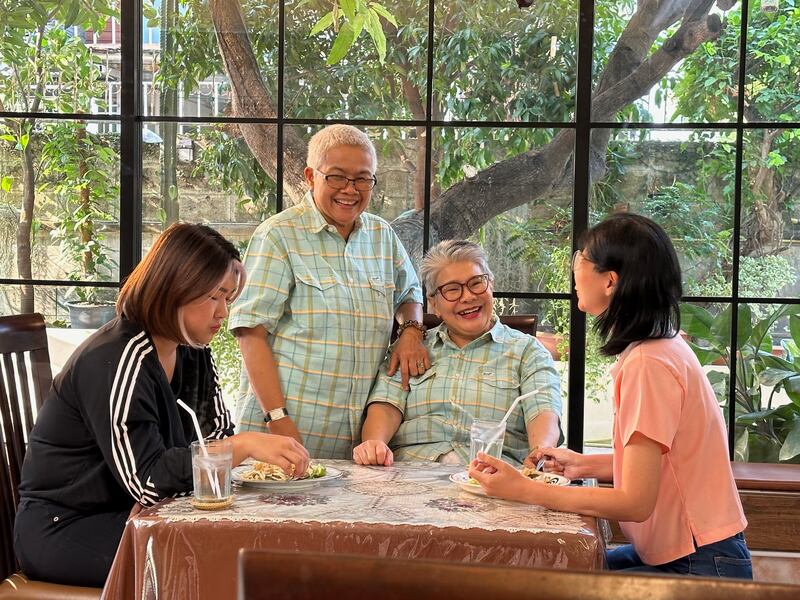Pakodchakon Wongsupha and her partner are among aging gay couples in Thailand eagerly anticipating the finalization of a marriage equality bill, so they can enjoy their golden years together with the same rights as their traditionally wed compatriots.
Pakodchakon and her partner of over three decades, Kan Kerdmeemun, have been advocating for LGBTQ rights and allowing same-sex couples to make critical medical decisions for each other and be on an equal legal footing as other married couples.
“We have mental stability to a certain level. But it’s necessary to have social and legal support, too. If not, it will be very difficult to do anything,” Pakodchakon, 67, told BenarNews.
She calls herself “grandma,” while Kan, 72, refers to herself as “grandpa.”
“With our age, if grandpa becomes critically ill and needs a life support device, I don’t have any legal right to sign off for the medical treatment,” Pakodchakon said.
“If something went wrong that resulted in death, I wouldn’t have the legal right to file any complaint like other legalized couples,” Pakodchakon said. “It makes me hurt when I think about it,” she said while squeezing her partner’s hand.
Their wish may come true after the lower house of Parliament passed the Marriage Equality Bill, which aims to legalize same-sex marriage in Thailand, at its first reading in December.
The push for legalizing same-sex marriage in the country gained momentum in mid-2012 when LGBTQ activist Natee Theerarojanapong and his partner were denied marriage registration because of their gender, leading to the drafting of a civil partnership bill in 2013.
A military coup that forced Prime Minister Yingluck Shinawatra from office and brought Prayuth Chan-o-cha to power in 2014 derailed efforts on the legislation.
Fast forward to late 2023, the tides turned again.
The equality bill cleared its first hurdle in the House of Representatives. It is being reviewed by a committee and must pass both houses before being sent to the king for his approval.
If he approves, the government will publish the bill in the Royal Gazette before it becomes law – a process that would make Thailand the first country in Southeast Asia and only the third in Asia to recognize same-sex marriage. There is no timeline for completing the process.
“Would you marry me when it’s legalized?” Kan asked, turning her head to look at Pakodchakon. “To show that I love you the most.”
On Wednesday – Valentine’s Day – the Bangkok Metropolitan Administration (BMA) plans to allow LGBTQ couples to register as married even though the registration would have no standing unless the bill becomes law.
Spokesman Ekwaranyu Amrapal said the initiative shows that the city’s administration is ready to give equal importance to all groups of citizens and act if the equality bill passes.
In 2023, about 130 LGBTQ couples registered in five districts of the BMA, less than half the 269 couples in 2022 when it opened registration for the first time.

Pakodchakon said although this registration has no legal effect, it will encourage LGBTQ couples to be proud of living together with their partners.
“Without legal support, it will be difficult to manage the assets that we created together when we lose our loved one,” Pakodchakon said. “While we are suffering from the loss, we still suffer from not being recognized. And it will be hard to carry on with this life.”
“Thailand’s 1990s weren’t kind to same-sex couples. Societal norms dictated disapproval, often labeling them as mentally ill and perverted,” Pakodchakon said.
Unaccepted love
She remembers facing harsh judgment – some mothers would forbid their children from playing with her.
“In the past, if people knew that we were lovers, we were deemed as having a mental illness and were perverted,” Pakodchakon said.
Even her own family was slow to accept her. Pakodchakon, whose Thai-Chinese-Vietnamese family operated a business in northeastern Sakon Nakhon, faced questions from relatives.
“My family didn’t try to stop us, but they raised many questions,” Pakodchakon said. “‘How could we live like this? What did the future look like and what will happen in our old age?”
Pakodchakon and Kan demonstrated their ability to build a stable and loving life together, proving their commitment to each other and defying societal expectations. Slowly but surely, acceptance took root.
“We showed them that we can live together comfortably and didn’t become a problem for anyone,” Kan said. “And promised not to be a burden to anyone.
“We are still living together and there is nothing changed,” Pakodchakon said. “My family accepted us now because they didn’t see it as alienation.”

After more than 30 years together, Pakodchakon and Kan are well known in online communities. Sharing their story and experiences through social media, they have connected with others from Thailand, Laos and the Philippines who find encouragement and solace in their openness and dedication.
“We help each other every day. We love each other every day. It’s about the two of us, nothing to do with others,” Kan said while squeezing Pakodchakon’s hand.
LGBTQ café
In early January, the two decided to renovate their house in Charansanitwong, on the western side of Bangkok to create “Pukaya Café” or “Grandpa and Grandma Café.” It offers a menu of traditional pad Thai, stir-fried basil, spring rolls and fried tofu.
Gone are the days of chasing profit.
For Pakodchakon and Kan, “Pukaya Café” is a labor of love born from a desire to keep Kan engaged and combating concerns about potentially suffering from Alzheimer’s disease.
Transforming their front yard into a cafe with Kan taking the reins as chef has yielded heartwarming results.
“She’s happier, more vibrant, and her memory seems to blossom when she’s cooking and interacting with guests,” Pakodchakon said, smiling.
“We don’t open a restaurant for profit, but to improve society. Our profit is our happiness,” Pakodchakon said.
She noted that while views have changed, some Thai families do not accept LGBTQ people. Their home café is a safe space for same-sex couples to get to know each other and share experiences.
They remain committed to equal rights and legal recognition for life partners of all genders.
“Our hope,” Pakodchakon said, “is to inspire other LGBTQ couples to celebrate their relationships, showing that a fulfilling life together until the very end, is truly possible.
“All human beings who live as a life partner in every gender shall deserve equal rights, welfare and legal recognition.”
